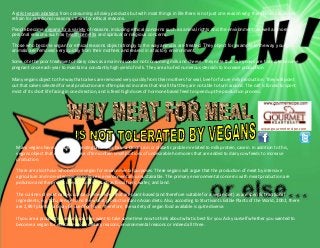
Why meat for meal is not tolerated by vegans
- 1. www.gourmetrecipe.com A strict vegan abstains from consuming all dairy products but with most things in life there is not just one reason why this should be. Some refrain for nutritional reasons others for ethical reasons. People become vegans for a variety of reasons, including ethical concerns such as animal rights and the environment, as well as more personal reasons such as health benefits and spiritual or religious concerns. Those who become vegan for ethical reasons object strongly to the way animals are treated. They object for example to the way young animals are removed very quickly from their mothers and reared in a factory environment. Some cite the poor treatment of dairy cows as a main reason for not consuming milk and cheese. They note that dairy cows are forced to become pregnant once each year to maintain a constantly high yield of milk. They are also fed numerous steroids to increase production. Many vegans object to the way that calves are removed very quickly from their mothers for veal, beef or future milk production. They will point out that calves selected for veal production are often placed in crates that small that they are not able to turn around. The calf is forced to spent most of its short life facing in one direction, and is feed high doses of hormone based feed to speed up the production process. Many vegans have a problem digesting lactose or have a blood-iron or diabetic problem related to milk protein, casein. In addition to this, vegans object that milk and cheese often contain small portions of undesirable hormones that are added to dairy cow feeds to increase production. There are also those who become vegan for environmental purposes. These vegans will argue that the production of meat by intensive agriculture and non-intensive agriculture is environmentally unsustainable. The primary environmental concerns with meat production are pollution and the prolific use of resources such as fossil fuels, water, and land. The cuisines of most nations contain some dishes that are plant-based (and therefore suitable for a vegan diet) as are specific traditional ingredients, e.g. tofu, tempeh and the wheat product seitan in Asian diets. Also, according to Sturtivants Edible Plants of the World, 2002, there are 2,897 plants that may be used for food. Therefore, the variety of vegan food available is quite diverse. If you are a prospective vegan, you may want to take some time now to think about what is best for you. Ask yourself whether you wanted to become a vegan for ethical reasons, dietary reasons, environmental reasons or indeed all three.
